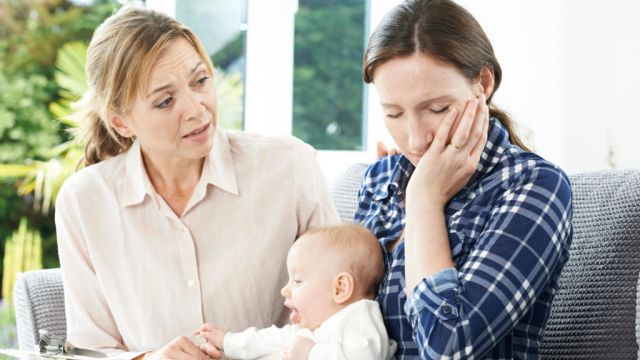Birth trauma is in the spotlight this week, with calls for a national plan to improve maternity care following a UK parliamentary inquiry into the topic.
According to The Times, a report by the all-party inquiry, led by Conservative MP Theo Clarke and Labour MP Rosie Duffield, found “poor care is all frequently tolerated as normal, and women are treated as an inconvenience”.
Also, in her new book Lucky: Learning to Live Again, which is out later this month, former Made In Chelsea star Louise Thompson is opening up about the true extent of the birth trauma she experienced when having her son Leo, in November 2021.
An exclusive extract published in the Mail on Sunday revealed Thompson at one point thought she had died, and recounted seeing “immense amounts of my blood splattering all over the curtain where they are cutting me open”.
She eventually had an emergency C-section after previously being refused one, and required multiple blood transfusions after suffering a life-threatening tear to her womb. Thompson developed post-traumatic stress disorder (PTSD) as a result.
And she is not alone. According to the Birth Trauma Association, research suggests around four to five per cent of women experience PTSD after birth, which equates to around 25,000-30,000 a year in the UK. And figures for those who experience varying degrees of trauma symptoms are much higher.
So, what does birth trauma mean, and how should new mothers be supported after a traumatic birth?
What does traumatic birth mean?

Lesley Gilchrist, a midwife from My Expert Midwife and birth expert at The Baby Show, says what amounts to a traumatic birth can be different for different people. However, she believes a few key things can play a part.
“Firstly, the perception of the reality of childbirth. If women aren’t prepared for the reality of birth and have been miseducated when they are advised by the midwife to do things, and they say no, you’re already seeing the midwife as the enemy. Women are getting a shock to the system and need to prepare for the reality of what it’s really like to have your first baby.”
Gilchrist also thinks having, or not having, a sense of control makes a big difference.
“When you dig down, it’s not always pain that causes trauma, but control. If you can plan, and you know what it is you can have and can’t have, you feel more empowered,” she says.
“So, if a woman would like an epidural, it’s important for them to be aware that they might not be able to have one immediately, that they may have to wait, and this can be a shock when they are told this and mean they lose control and that coping mechanism is already gone. Women need to look into the options for pain relief and go into labour with an expectation of what they can have.
“Thirdly, it’s down to the kindness and compassion that women receive,” Gilchrist stresses. “The assumption is that when you come to the hospital, you will meet someone who is meant to be caring for you. You and your partner are extremely vulnerable, so when they’re faced with dismissive or uncompassionate attitudes, they don’t feel they’ve got trust in the situation or control, as they feel this person that’s caring for them, that should be by their side supporting them, isn’t.”
How do you recover from a traumatic birth?
Depending on the individual circumstances, there may be physical trauma to recover from. But psychological trauma is different. The impact here may be more complex and take longer to process.
“When it comes to anxiety after a traumatic birth, women will catastrophise and ruminate, they’ll visualise those terrible things happening to their baby and have horrific intrusive thoughts and high-level anxiety, where they can’t catch their breath or keep calm,” says Gilchrist.

In some cases, this can have a long-lasting impact. But Gilchrist assures that with appropriate treatment and therapy, it does get better.
“Therapies are good, but it’s important to find a therapist or psychotherapist who is qualified and trained in this. You need to find someone skilled in the entire sphere of psychology and mental health, as they will understand if one thing hasn’t worked, then another thing will work,” she says.
“Therapy teaches you how to manage the symptoms. For a lot of women, they’ll have had general anxiety anyway before, and this has just increased it. But it does give you great coping strategies for life.”
She adds: “I would recommend anyone to explore hypnobirthing. The tools you get taught help anxiety, as you can shut out the intrusive thoughts with deep meditation.”
What support might new mothers need?
Having a traumatic birth often leads to a higher risk of post-natal depression too, so Gilchrist suggests you put everything in place to help reduce the impact.
“Family support is so important,” she says. “You need family and visitors that are going to come and clean your kitchen, cook food, do laundry – it’s lasagne, not lilies you want. Women who have suffered traumatic birth don’t want to be away from the baby, so don’t offer to take the baby, but just be there for them.”
What resources are available?
Gilchrist says support resources can be very important for new mothers and their partners affected by birth trauma.
“Facebook is an excellent peer support group, including the Birth Trauma Support Group,” she says. “There is also a website providing support, guidance and listening called the Birth Trauma Association.“







